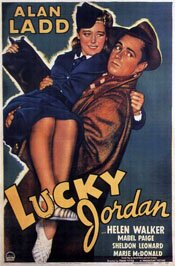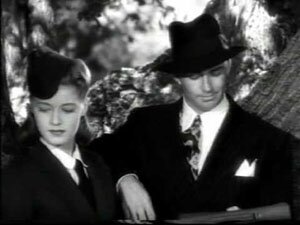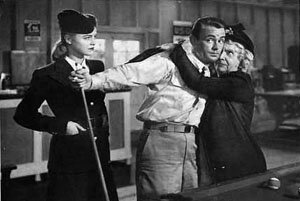Edward G. Robinson was one helluva a good actor. He even makes this exercise in the absurd and perfunctory a crime drama you can watch, even enjoy at moments. Often found in film noir collections, it isn’t noir. In a way, it’s screwball comedy without the humour.
Predator and prey and packs in Collateral
This movie is filled with fascinating imagery as Michael Mann presents a nocturnal vision of the city that is dark and threatening. It also has a key image, the coyote, that I think many people misremember. If you look at it closely, it’s not quite the image you think you saw and its meaning is very different when you really see what Michael Mann show us.
How and why Nick and Nora work
The series of Thin Man movies answers the question, “What does happily ever after look like?”
Less fun than sobering: Spielberg’s Catch Me
I watched Steven Spielberg’s Catch Me If You Can yet again (third time) over the weekend and now I’m back to my original opinion (as opposed to the one expressed below). Despite being promoted as ‘fun,’ and despite the sixties style ‘fun’ animation of the title sequence, this is really a rather somber story of a young man desperate to save his father from a marriage and life that are disintegrating.
The accidental film noir: I Wake Up Screaming
It’s Day 2 of For the Love of Film (Noir) — don’t forget to (or use the button on the right). Today I have a quickly scribbled, un-proofed, un-thought through look at the movie I watched last night. The studio considered calling it Hot Spot but, according to the DVD I have, the actors insisted on them using the original name, which is …
I Wake Up Screaming (1941)
Directed by H. Bruce Humberstone
As I watched I Wake Up Screaming last night I had two thoughts running concurrently. First, this should not be a good movie. Second, somehow it manages to be a good movie. How does that happen?
I’m not sure. I think it lies partly in Betty Grable, whose performance is a level above the other main actors in the movie.
It’s also in the characterization of Ed Cornell, played by Laird Cregar, who seems a cross between Vincent Price (in the slightly effeminate voice and its cadence) and possibly a low rent version of George Sand. (I mean vocally, nothing else, and not much there either. But there seems to be something vaguely Sand-ish in the voice.)
Cregar’s Cornell is creepy, to say the least, and that makes the movie compelling. Though the film’s mystery may be obvious, it doesn’t matter. The creepiness keeps us fascinated in a “slowing down to view the accident” kind of way. Cregar’s character isn’t the only one that gives us the willies.
Elisha Cook Jr.’s Harry is equally troubling. Soft-spoken and gentle, his focus and attentiveness to Grable’s Jill Lynn leaves us feeling something isn’t right about him. He’s stalker material.
Much of what makes the movie watchable is in the script. The bad guys in this movie – and there are a lot of them – are not villains so much in the commitment of crimes regard, as in their psychology. In fact, most of them have stalker-like personalities or variants of it.
They are all focused in some way on Vicky Lynn, played by Carole Landis. They want to either possess her, use her, or both. And she, being ambitious, is happy to permit it as she uses them. Thus, in a sense, she invites what follows from it.
Into this morass of twisted personalities come Victor Mature as Frankie, a kind of nice if goofy sports promoter (who find himself accused of murder) and Vicky’s sister, Grable’s Jill Lynn.
Frankie and Jill are the normal ones (for lack of a better word) and also the ones who suffer the consequences of a world populated by twisted personalities.
Visually, the movie delivers the noir goods but that may be less an aesthetic decision as a kneejerk response to making a crime movie in the forties. Crime equals scenes of darkness and shadow, ergo scenes of darkness and shadow. I get the sense director H. Bruce Humberstone was a paint-by-numbers kind of director, though that may be unfair to him. But that is how it strikes me.
Still, by accident or design, the movie looks good as a noir. It has a low budget feel and some very nice shots, especially near the end where we see Mature looking down at Harry snoozing at the front desk.
Overall, then, I Wake Up Screaming strikes me as an accidental noir. It discovers a noir world in the script it brings to the screen and in the kind of kneejerk response of how it visually portrays that script.
Much of what happens on screen is highly melodramatic and it would be too much were it not for the material driving it, Laird’s unsettling Cornell, and Grable’s much better anchored performance as Jill. Victor Mature looks great as a noir character, especially in the interrogation scenes, but he is often well over-the-top. Also, for about two thirds of the movie, once outside the interrogation room (and often within it) he plays a goofy kind of guy without a care in the world. It’s deliberate, in part, as it’s an aspect of the character. But it just seems too much.
And having gone on with all these negative comments about the movie, I still have to say I liked it quite a bit. However, it feels to me it’s a good movie through dumb luck; a film noir by accident.
Lucky Jordan a pleasant surprise
Once again, I stumbled on a movie I wasn’t looking for or even aware of. But last night I skipped through channels and came on TCM. The movie they were showing? Lucky Jordan. (Later, they showed The Snows of Kilimanjaro, 1952, a movie I personally find incredibly tedious. But that’s personal taste …)
 Lucky Jordan (1942)
Lucky Jordan (1942)
Directed by Frank Tuttle
I really wish I had been around in 1942 and been in a theatre at a screening of this movie, Lucky Jordan. I think the response to it would have been fascinating to see.
The U.S. had already endured Pearl Harbour. They had entered World War II. And here was a movie where the lead character wanted nothing to do with the military; he had nothing but disdain for it.
How did they make that fly?
Undoubtedly it helped to have Alan Ladd, who was becoming a name by this time. (He had previously done movies like This Gun For Hire. This movie, Lucky Jordan, was the first one in which he had top billing, I believe.)
Ladd plays Lucky Jordan and through well over the first half of the movie he plays a gangster with no interest or love for anyone but himself and his money. He’s a cynic and believes everything and everyone can be bought, until he comes up against the draft board.
 He eventually finds himself in the Army where he is contemptuous of it. He goes AWOL and finally deserts. He comes upon secret military plans which another gangster (Sheldon Leonard as Slip Moran) has plans to sell to the Nazi’s. Slip also has plans to take over from Lucky.
He eventually finds himself in the Army where he is contemptuous of it. He goes AWOL and finally deserts. He comes upon secret military plans which another gangster (Sheldon Leonard as Slip Moran) has plans to sell to the Nazi’s. Slip also has plans to take over from Lucky.
But Lucky has other plans – get rid of Slip and sell the plans himself, but for more money.
In the process he kidnaps Jill Evans (Helen Walker), a woman in the military who pleads love of country to Lucky, but it falls on deaf ears.
The way the movie manages to turn the character of Lucky around, as eventually it must, is through an old woman living in poverty, Annie (aka ‘Ma’), played wonderfully by Mabel Paige. Annie and Lucky adopt one another, so to speak, and develop a kind of mother and son relationship. This is the first time we start to see chinks in Lucky’s cynical armor and the glimmers of a human being.
Alan Ladd plays the part of Lucky nicely. What often comes across is not hard-bitten and cynical but a sense of genuine puzzlement when his motives are questioned. Isn’t everyone out for themselves? Why would he do anything else?
 The movie ends with an inevitable patriotic finish, the final scene feeling like an obligatory add-on. But in the process of getting from start to end, it tells a good story about a particular character, Lucky Jordan. In the process, it doesn’t simply use a self-centred individual. The script gives some explanation for why he is as he is by giving some detail on his background.
The movie ends with an inevitable patriotic finish, the final scene feeling like an obligatory add-on. But in the process of getting from start to end, it tells a good story about a particular character, Lucky Jordan. In the process, it doesn’t simply use a self-centred individual. The script gives some explanation for why he is as he is by giving some detail on his background.
On the whole, this movie was a very pleasant surprise. It’s a movie cranked out by the Hollywood factory but it’s also one that manages to work well within its constraints – even push them a little, given how explicitly unpatriotic and unrepentant the character of Lucky is through a large portion of the film.


